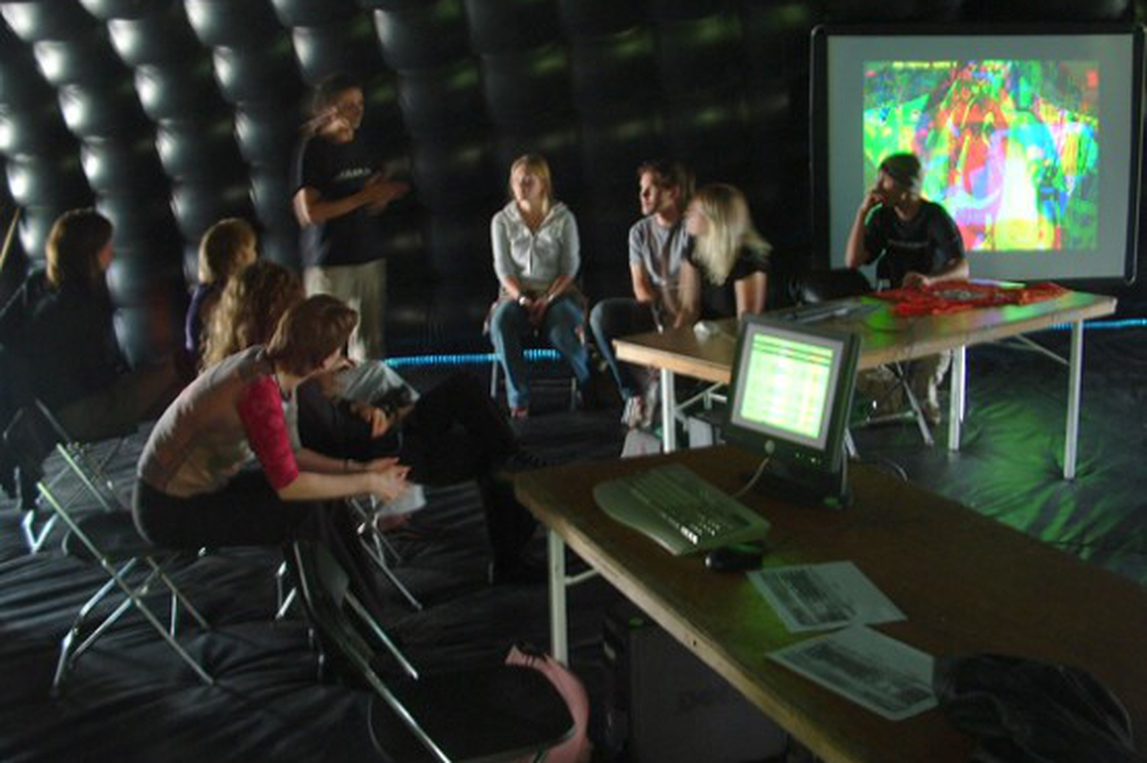Visualising the Future: Crafting Visualisations of the World to Come
In May 2013, Culture Lab and ISIS Arts presented Visualising the Future; a lab exploring the potential of visualisations to envision futures that participants would like to live in and experience that took place in the Big M, our inflatable touring venue.
Visualisations are selective representations of reality. As we create a visualisation, the subject matter is as much our own perspective as it is the data. When developing a visualisation that is based on not-yet evidenced data but on prognostications, our anticipations and desires materialise in concrete forms.
The starting point for any visualisation is usually data collected from the past. In this workshop, participants explored the potential to use visualisation tools to forecast potential versions of the future. The workshop engaged participants in the relationship between visions of the future and personal values. Emphasis falls on how visualisation can be a powerful way to reveal values that have not been made explicit by the participants, in contrast with a more descriptive, narrative account of the future.
By inviting people to select which kind of data facets they want to consider in their own visions of the future, the visualisations turned into an indicator of values, hopes, and fears associated with personal or global phenomena. Participants used imaginary data and paper prototyping to explore the topic through tangible means using a variety of materials and basic tools to build exchange and critically discuss physical representations of their own visions of the future.
Workshop organisers: Gabriella Arrigoni, Marian Dork, Bettina Nissen, Tom Schofield and Brigitta Zics. Project leaders: Peter Wright and Brigitta Zics.
Visualising the Future is a collaboration between Culture Lab (Newcastle University) and ISIS Arts.
Culture Lab is home to Newcastle University’s Digital Interaction and Digital Media research groups and is the focal point for research in human-computer interaction and digital creative practice at Newcastle University. Its' members engage in experimental and cross-disciplinary projects in interaction design and creative digital arts in a technologically rich and custom designed environment.
Visualisations are selective representations of reality. As we create a visualisation, the subject matter is as much our own perspective as it is the data. When developing a visualisation that is based on not-yet evidenced data but on prognostications, our anticipations and desires materialise in concrete forms.
The starting point for any visualisation is usually data collected from the past. In this workshop, participants explored the potential to use visualisation tools to forecast potential versions of the future. The workshop engaged participants in the relationship between visions of the future and personal values. Emphasis falls on how visualisation can be a powerful way to reveal values that have not been made explicit by the participants, in contrast with a more descriptive, narrative account of the future.
By inviting people to select which kind of data facets they want to consider in their own visions of the future, the visualisations turned into an indicator of values, hopes, and fears associated with personal or global phenomena. Participants used imaginary data and paper prototyping to explore the topic through tangible means using a variety of materials and basic tools to build exchange and critically discuss physical representations of their own visions of the future.
Workshop organisers: Gabriella Arrigoni, Marian Dork, Bettina Nissen, Tom Schofield and Brigitta Zics. Project leaders: Peter Wright and Brigitta Zics.
Visualising the Future is a collaboration between Culture Lab (Newcastle University) and ISIS Arts.
Culture Lab is home to Newcastle University’s Digital Interaction and Digital Media research groups and is the focal point for research in human-computer interaction and digital creative practice at Newcastle University. Its' members engage in experimental and cross-disciplinary projects in interaction design and creative digital arts in a technologically rich and custom designed environment.

